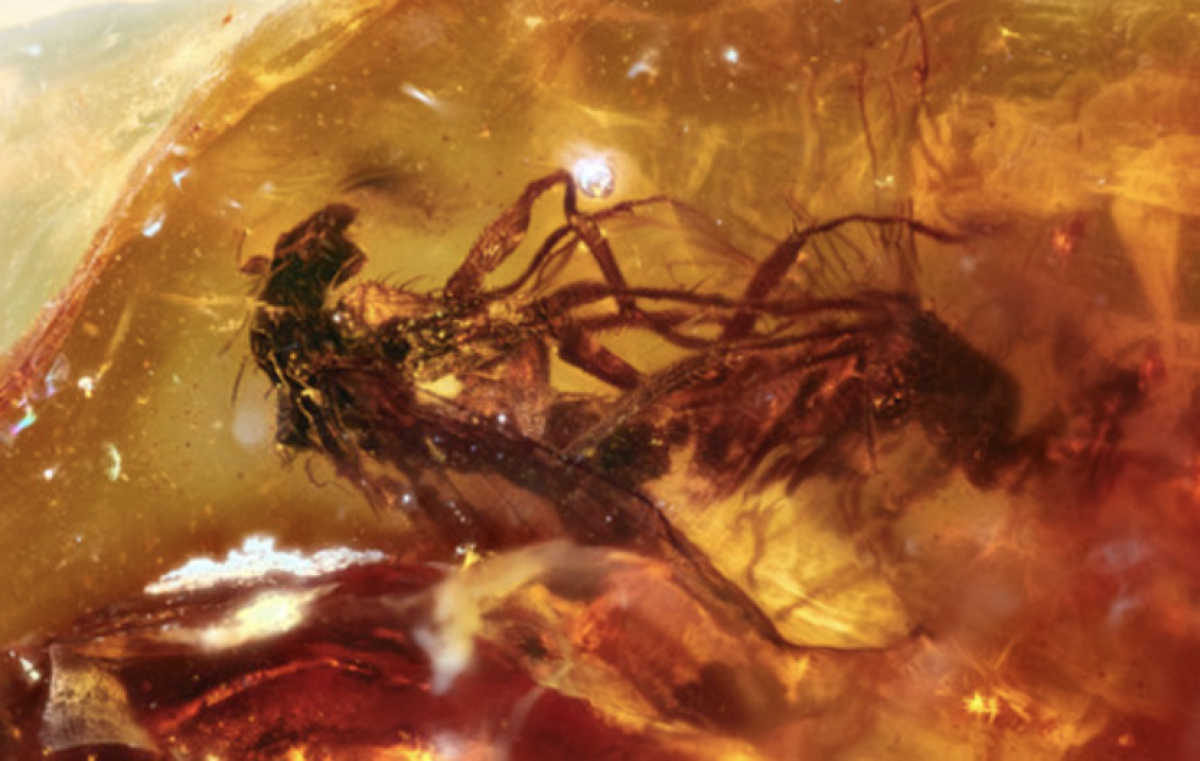Paleontologists have unearthed a piece of amber containing two mating flies that were frozen in the act 40-42 million years ago.
The flies were found among a vast trove of prehistoric amber discovered in Australia and Tasmania, and detailed in Nature Scientific Reports. The paper describes some of the oldest plants and animals found in Australia and Zealandia that lived on the ancient supercontinents of Pangea and Gondwana between 230 and 40 million years ago.
Fossilized tree resin—or amber—is more commonly found in the Northern Hemisphere in countries like Myanmar. It is scarcer in southern latitudes, making discoveries like those described in the paper more unusual.
According to the researchers, fossil-rich deposits in Australia and eastern Zealandia containing pieces from the Late Triassic to early Paleogene have "boosted" the amount of amber discovered in recent years.
Among these pieces are 5,800 obtained from Western Tasmania (aged 54 to 52 million years old) and Victoria, Australia (aged 42 to 40 million years old). Several contain the well-preserved remains of ancient plants and animals—including the mating flies.
The flies come from the family Ceratopogonidae, which is known have existed since the Jurassic Period (201 to 145 million years ago).
The oldest record of flies from this family in Australia is a compression fossil—a 2D impression of a 3D organism—found in the Early Cretaceous Koonwarra beds in Victoria.
In contrast, the amber presents two complete specimens—one male and one female—as well as one incomplete specimen from the genus Culicoides Latreille.
The researchers say the mating flies could be the first example of what they call "frozen behavior" in Australia's fossil record.
"Frozen behaviours are rarely recorded in the fossil record, but can be quite diverse, including defence, parasitism, feeding, swarms, and so on," lead author Associate Professor Jeffrey Stilwell from the School of Earth, Atmosphere and Environment at Monash University, Austria, said in a statement.

Other fossilized specimens described in the paper include biting midges and juvenile spiders. The latter was found in a cluster and researchers say it is likely the spiders were trapped soon after hatching.
Two liverwort and two moss species were also found in the amber, as well as the first fossil ants from Southern Gondwana and the first "slender springtails"—a family of tiny, wingless insects—from Australia.
Stilwell said the discoveries offer new insights on the origin and evolution of species living in Australia today, while highlighting the potential for similar finds in this part of the world.
"Amber is considered to be a 'Holy Grail' in the discipline, as organisms are preserved in a state of suspended animation in perfect 3D space, looking just like they died yesterday—but in fact are many millions of years old, providing us with an enormous amount of information on ancient terrestrial ecosystems," Stilwell said in a statement.
Amber can offer several interesting insights into the past, including the discovery of new species—whether that is a 99-million-year-old millipede in Myanmar or a 30-million-year-old "mold pig" that resembles (but is unrelated to) tardigrades.
Amber-trapped organisms can also offer important insights when it comes to the evolutionary history of different species or groups of species—for example, the evolution of birds in the Cretaceous.
Uncommon Knowledge
Newsweek is committed to challenging conventional wisdom and finding connections in the search for common ground.
Newsweek is committed to challenging conventional wisdom and finding connections in the search for common ground.
About the writer
To read how Newsweek uses AI as a newsroom tool, Click here.








